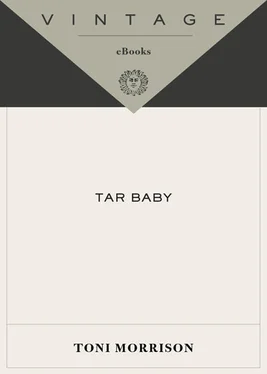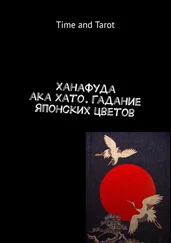Toni Morrison - Tar Baby
Здесь есть возможность читать онлайн «Toni Morrison - Tar Baby» весь текст электронной книги совершенно бесплатно (целиком полную версию без сокращений). В некоторых случаях можно слушать аудио, скачать через торрент в формате fb2 и присутствует краткое содержание. Жанр: Старинная литература, на русском языке. Описание произведения, (предисловие) а так же отзывы посетителей доступны на портале библиотеки ЛибКат.
- Название:Tar Baby
- Автор:
- Жанр:
- Год:неизвестен
- ISBN:нет данных
- Рейтинг книги:3 / 5. Голосов: 1
-
Избранное:Добавить в избранное
- Отзывы:
-
Ваша оценка:
- 60
- 1
- 2
- 3
- 4
- 5
Tar Baby: краткое содержание, описание и аннотация
Предлагаем к чтению аннотацию, описание, краткое содержание или предисловие (зависит от того, что написал сам автор книги «Tar Baby»). Если вы не нашли необходимую информацию о книге — напишите в комментариях, мы постараемся отыскать её.
Tar Baby — читать онлайн бесплатно полную книгу (весь текст) целиком
Ниже представлен текст книги, разбитый по страницам. Система сохранения места последней прочитанной страницы, позволяет с удобством читать онлайн бесплатно книгу «Tar Baby», без необходимости каждый раз заново искать на чём Вы остановились. Поставьте закладку, и сможете в любой момент перейти на страницу, на которой закончили чтение.
Интервал:
Закладка:
Except for the kitchen, which had a look of permanence, the rest of the house had a hotel feel about it—a kind of sooner or later leaving appearance: a painting or two hung in an all right place but none was actually stationed or properly lit; the really fine china was still boxed and waiting for a decision nobody was willing to make. It was hard to serve well in the tentativeness. No crystal available (it too was closed away in Philadelphia) so a few silver trays had to do for everything from fruit to petits fours. Every now and then, the Principal Beauty, on one of her trips, brought back from the States another carton chock-full of something Sydney asked for: the blender, the carborundum stone, two more tablecloths. These items had to be carefully selected because they were exchanged for other items that she insisted on taking back to Philadelphia. It was her way of keeping intact the illusion that they still lived in the States but were wintering near Dominique. Her husband encouraged her fantasy by knotting every loose string of conversation with the observation “It can wait till we get home.” Six months after they’d arrived Sydney told his wife that periodic airing of trunk luggage in the sunlight was more habit than intention. They would have to tear down that greenhouse to get him off the island because as long as it was there, he’d be there too. What the devil does he do in there, she had asked him.
“Relaxes a little, that’s all. Drinks a bit, reads, listens to his records.”
“Can’t nobody spend every day in a shed for three years without being up to some devilment,” she said.
“It’s not a shed,” said Sydney. “It’s a greenhouse I keep telling you.”
“Whatever you call it.”
“He grows hydrangeas in there. And dahlias.”
“If he wants hydrangeas he should go back home. He hauls everybody down to the equator to grow Northern flowers?”
“It’s not just that. Remember how he liked his study back at the house? Well, it’s like that, except it’s a greenhouse kind of a study.”
“Anybody build a greenhouse on the equator ought to be shame.”
“This is not the equator.”
“Could of fooled me.”
“Nowhere near it.”
“You mean there’s some place on this planet hotter than this?”
“I thought you liked it here.”
“Love it.”
“Then stop complaining.”
“It’s because I do love it that I’m complaining. I’d like to know if it’s permanent. Living like this you can’t figure nothing. He might pack up any minute and trot off someplace else.”
“He’ll be here till he dies,” Sydney told her. “Less that greenhouse burns up.”
“Well, I’ll pray nothing happens to it,” she said, but she needn’t have. Valerian took very good care of the greenhouse for it was a nice place to talk to his ghosts in peace while he transplanted, fed, air-layered, rooted, watered, dried and thinned his plants. He kept a small refrigerator of Blanc de Blancs and read seed catalogs while he sipped the wine. Sometimes he gazed through the little greenhouse panes at the washhouse. Other times he checked catalogs, brochures and entered into ringing correspondence with nurseries from Tokyo to Newburgh, New York. He read only mail these days, having given up books because the language in them had changed so much—stained with rivulets of disorder and meaninglessness. He loved the greenhouse and the island, but not his neighbors. Luckily there was a night, three years ago, after he’d first settled into tropic life, when he woke up with a toothache so brutal it lifted him out of bed and knocked him to his knees. He knelt on the floor clutching the Billy Blass sheets and thinking, This must be a stroke. No tooth could do this to me. Directly above the waves of pain his left eye was crying while his right went dry with rage. He crawled to the night table and pressed the button that called Sydney. When he arrived, Valerian insisted on being taken to Queen of France at once, but there was no way to get there. At that hour fishermen had not even begun to stir and the launch was twice a week. They owned no boat and even if they had neither Sydney nor anyone else could handle it. So the quick-witted butler telephoned the neighbors Valerian hated and got both the use of a fifty-six-foot Palaos called Seabird II and the boat skills of the Filipino houseboy. After a daring jeep ride in the dark, an interminable boat ride and a taxi ride that was itself a memory, they arrived at Dr. Michelin’s door at 2:00 a.m. Sydney banged while the Filipino chatted with the taxi driver. The dentist roared out the second floor window. He had been run out of Algeria and thought his door was being assaulted by local Blacks—whose teeth he would not repair. At last, Valerian, limp and craven, sat in the dentist’s chair where he gave himself up to whatever the Frenchman had in mind. Dr. Michelin positioned a needle toward the roof of Valerian’s mouth but seemed to change his mind at the last minute, for Valerian felt the needle shoot straight into his nostril on up to the pupil of his eye and out his left temple. He stretched his hand toward the doctor’s trousers, hoping that his death grip—the one they always had to pry loose—would be found to contain the crushed balls of a D.D.S. But before he could get a grip under the plaid bathrobe, the pain disappeared and Valerian wept outright, grateful for the absence of all sensation in his head. Dr. Michelin didn’t do another thing. He just sat down and poured himself a drink, eyeing his patient in silence.
This encounter, born in encouraged hatred, ended in affection. The good doctor let Valerian swallow a little of his brandy through a straw and against his better judgment, and Valerian recognized a man who took his medical oaths seriously. They got good and drunk together that night, and the combination of Novocain and brandy gave Valerian an expansiveness he had not felt in years. They visited each other occasionally and whenever Valerian thought of that first meeting he touched the place where the abscess had been and smiled. It had a comic book quality about it: two elderly men drunk and quarreling about Pershing (whom Valerian had actually seen), neither one mentioning then or ever the subject of exile or advanced years which was what they had in common. Both felt as though they had been run out of their homes. Robert Michelin expelled from Algeria; Valerian Street voluntarily exiled from Philadelphia.
Both had been married before and the long years of a second marriage had done nothing to make either forget his first. The memory of those years of grief in the wake of a termagant was still keen. Michelin had remarried within a year of his divorce, but Valerian stayed a bachelor for a long time and on purpose until he went out for an after lunch stroll on a wintry day in Maine, a stroll he hoped would get rid of the irritable boredom he’d felt among all those food industry appliance reps. His walk from the inn had taken him only two blocks to the main street when he found himself in the middle of a local Snow Carnival Parade. He saw the polar bear and then he saw her. The bear was standing on its hind feet, its front ones raised in benediction. A rosy-cheeked girl was holding on to one of the bear’s forefeet like a bride. The plastic igloo behind them threw into dazzling relief her red velvet coat and the ermine muff she waved to the crowd. The moment he saw her something inside him knelt down.
Now he sat in the December sunlight watching his servant pour coffee into his cup.
“Has it come?”
“Sir?”
“The salve.”
“Not yet.” Sydney removed the lid from a tiny box of saccharin tablets and edged it toward his employer.
“They take their sweet time.”
“Mail’s cut back to twice a week I told you.”
Читать дальшеИнтервал:
Закладка:
Похожие книги на «Tar Baby»
Представляем Вашему вниманию похожие книги на «Tar Baby» списком для выбора. Мы отобрали схожую по названию и смыслу литературу в надежде предоставить читателям больше вариантов отыскать новые, интересные, ещё непрочитанные произведения.
Обсуждение, отзывы о книге «Tar Baby» и просто собственные мнения читателей. Оставьте ваши комментарии, напишите, что Вы думаете о произведении, его смысле или главных героях. Укажите что конкретно понравилось, а что нет, и почему Вы так считаете.











